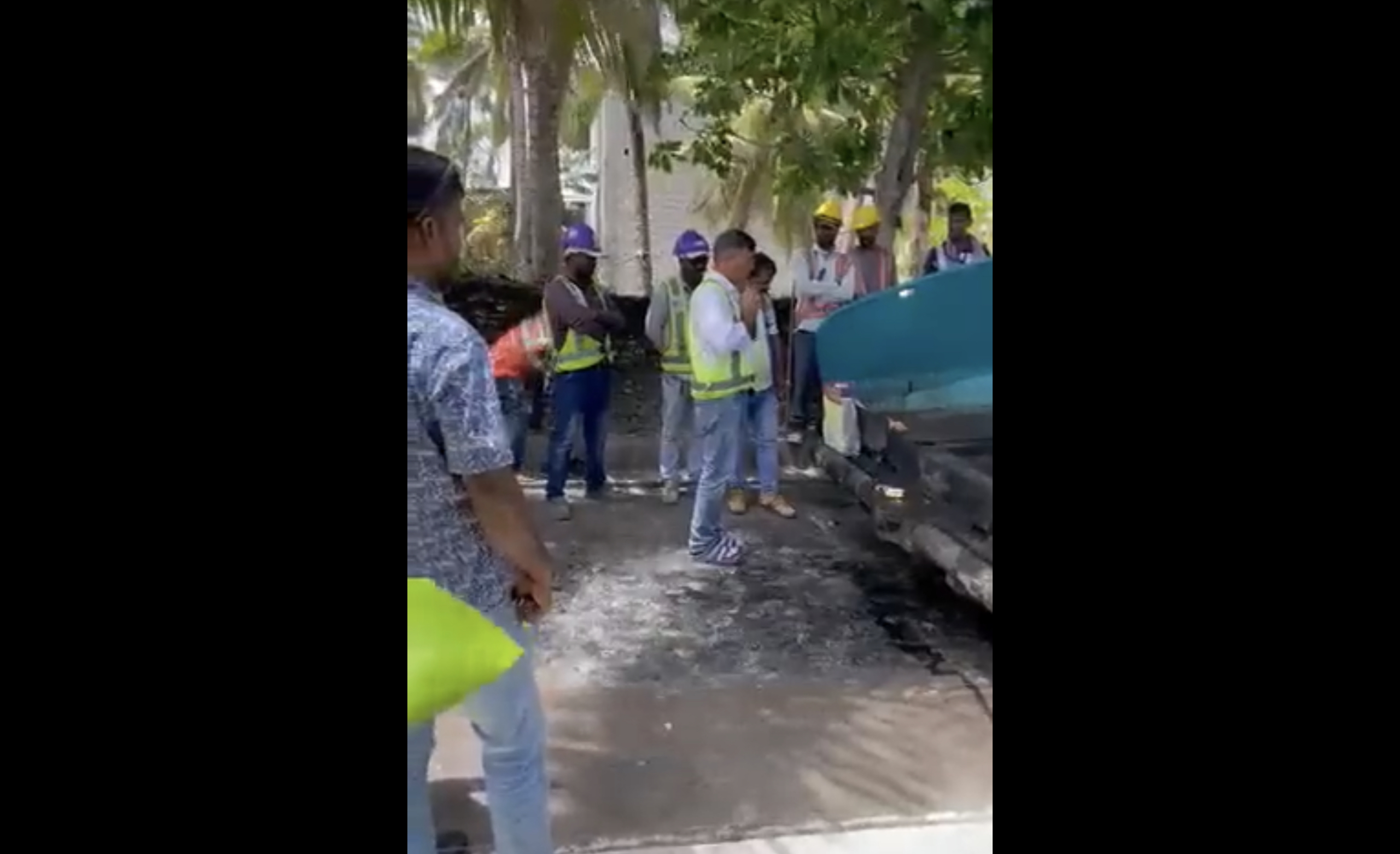Malé, Maldives – Government of Maldives has said that it will not allow anything against Islam to be carried out in the island nation.
Spokesperson of the President’s Office Miuvan Mohamed said today at a media briefing at the President’s Office amid criticism of the government over the Hindu worship by employees of India’s Afcons Infrastructure Limited company to officially start the construction of roads in Hithadhoo, Addu City.
Work on the development of Hithadhoo roads was commenced by Afcons on Tuesday by breaking a coconut, which is an act of Hindu worship. A video that went viral on social media shows workers praying near a machinery used for the road works, which is followed by them breaking a coconut on the machinery.
Following a journalists concern over the issues against Islam and the government does not take action, spokesman Miuvaan told that Maldives is a 100 percent Muslim country and will not allow anything against religion. He also added that if such a thing is done, action will be taken against them.
If anything unreligious happens, the government will take necessary action to ensure that it happens. We will not leave. Maldives is a 100 percent Islamic country. We will not allow any act against Islam in Maldives.
Spokesperson of the President’s Office Miuvan Mohamed
Some people are also criticizing the government for doing everything India wants stating that it is totally unacceptable and people have been outraged by the failure of the government to stop the act.
India’s AFCONS Infrastructure Limited has also come under public criticism over the low quality of their works in the Addu road development project. Parliamentarian for Addu City Feydhoo constituency, Mohamed Nihad had raised concerns over the quality of Addu City’s road development project recently.
The project was officially in March, 2022 during a special ceremony, where President Solih was accompanied by Foreign Minister of Maldives Abdullah Shahid and Minister of External Affairs of India Dr. S. Jaishankar.
By the end of the MVR 1.2 billion project contracted to India’s Afcons Infrastructure Limited, a total of 107 kilometres of road is expected to be developed to modern standards, including the installation of a 103 kilometer stormwater drainage system to solve the flooding issues currently prevalent in the city during rainy monsoons.
The project will be financed under the USD 800 million line of credit from the Exim Bank of India. According to the terms of the contract, Afcons needs to complete the project within 730 days.
The USD 147.1 million project to develop the roads of the city is set to be completed within 24 months. This project includes paving of about 40 km of unpaved road and providing street lights and CCTV coverage for all islands of Addu.
In addition to this, the road work involves development of a new 4-lane bypass through the shallow back-reef on the ocean side connecting Hithadhoo Island with Maradhoo Island. The project also includes establishing a drainage system for all roads in Addu except for Feydhoo district, with approximately 103km in length.
The total length is about 1.5 km out of which about 0.9 km will be on embankment and will require shore protection and borrow material and the remaining length is bridged with two bridges of 210m and 450m length. In addition to this, the resurfacing of 3.315 km of existing roads is also included in the project’s scope.
The Hithadhoo incident comes while three Indians were arrested in the island of Bilehdhoo, Faafu atoll over idolatry charges this September.
According to local sources the men had handmade the idol and painted it themselves to pray and later sunk it in the sea.
Under the Maldivian constitution non-muslims living in or visiting the country are prohibited from openly expressing their religious beliefs, holding public congregations to conduct religious activities, or involving Maldivians in such activities. By law, those expressing religious beliefs other than Islam face imprisonment of up to five years or house arrest, fines ranging from MVR 5,000 to MVR 20,000 (USD 320 – USD 1,300), and deportation.





